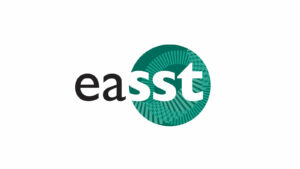Dear EASST Review readers,
The last two issues of EASST review have focused on the theme of Research Cultures. For this issue – the first of 2024 – the editorial team decided to be led by your concerns: earlier this year, we put out an open call inviting you to share your ideas with us. This has brought us pieces on topics that turned out to connect in surprising ways: among others we have a thoughtful contribution arguing for “liveable futures” instead of the often-heard talk of sustainability, by Anne Beaulieu and her team, a discussion of nuclear waste governance and how it points at a “democratic deficit” by Lee Towers, a dizzying (in a good sense) event report by Britta Acksel and colleagues, a piece by Tanja Bogusz et al. showing us why marine worlds matter to STS, and a reflection by Willemine Willems and colleagues on the possibility of science communication as theatrical dialogue.
We also mark the passing of Adele Clarke, with an In Memoriam by Isabel Fletcher, who reflects on Adele’s work and activism centered around North-American medicine and women’s reproductive health. Lastly, we have an update from the organizers of the upcoming 4S/EASST gathering in July, with some news about the conference and reflections on the challenges of accommodating so many STS-ers in one place!
We cannot consider livability, science-society dialogue, and democratic processes outside the current context of the war in/on Gaza, and the discussions it has raised across society as well as the academic landscape. As critical STS researchers, students, and educators, we cannot remain silent in light of the destruction of educational infrastructures and disregard for human lives, and must at the same time be aware of the effects it has had on revealing the cracks in our academic institutions. Indeed, in recent months the brittleness of academic freedom has been painfully laid bare, with student protest camps on campuses around Europe being violently removed and, in Germany, considerations by members of the Berlin Senate to re-introduce disciplinary expulsion for students expressing political opinions in universities (a measure originally developed to repress student movements in 1968). Furthermore, the German Minister of Education has explored ways to prosecute and cut the funding of academic staff who had signed a letter in solidarity with their demonstrating students. The impact that different initiatives are having in forcing universities – initially reluctant to do so – to take a position on the conflict show that academic communities are key actors in politics. We follow these developments with concern as we wish for our STS communities to offer spaces where dialogue, openness, and critical reflection are encouraged and not repressed.
Last but not least, we take this as an opportunity to proudly introduce our new editorial assistants (yes, two!) Paria Rezayi and Adam Dinsmore, who together have taken care of the copy editing of the contributions for this issue. Paria has a background in linguistics, focusing on academic writing, pragmatics and discourse analysis, while Adam is a PhD candidate at the University of York’s Department of Sociology, studying the various ways that ‘the elite’ are constructed in political discourse.
We look forward to seeing you at the conference in Amsterdam next month, at what is promising to be the largest STS conference of all time. We plan to take this opportunity to find out more from you, the readers, what you value about EASST Review, and what else we could be doing to improve on what we offer to the community already. The autumn issue will be dedicated to events at the conference, so if you wish to write something about the conference, do drop your friendly EASST Review editorial team a line with your ideas at review@easst.net. For those going, we wish you safe travels to Amsterdam.
The EASST Review editorial team
Jose Canada, Roos Hopman, Stefan Laser, Richard Tutton.
